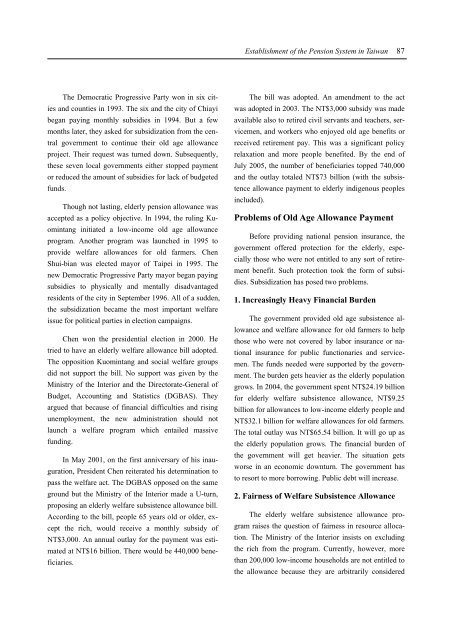PDF(2.7mb) - 國家政策研究基金會
PDF(2.7mb) - 國家政策研究基金會
PDF(2.7mb) - 國家政策研究基金會
Create successful ePaper yourself
Turn your PDF publications into a flip-book with our unique Google optimized e-Paper software.
Establishment of the Pension System in Taiwan 87<br />
The Democratic Progressive Party won in six cities<br />
and counties in 1993. The six and the city of Chiayi<br />
began paying monthly subsidies in 1994. But a few<br />
months later, they asked for subsidization from the central<br />
government to continue their old age allowance<br />
project. Their request was turned down. Subsequently,<br />
these seven local governments either stopped payment<br />
or reduced the amount of subsidies for lack of budgeted<br />
funds.<br />
Though not lasting, elderly pension allowance was<br />
accepted as a policy objective. In 1994, the ruling Kuomintang<br />
initiated a low-income old age allowance<br />
program. Another program was launched in 1995 to<br />
provide welfare allowances for old farmers. Chen<br />
Shui-bian was elected mayor of Taipei in 1995. The<br />
new Democratic Progressive Party mayor began paying<br />
subsidies to physically and mentally disadvantaged<br />
residents of the city in September 1996. All of a sudden,<br />
the subsidization became the most important welfare<br />
issue for political parties in election campaigns.<br />
Chen won the presidential election in 2000. He<br />
tried to have an elderly welfare allowance bill adopted.<br />
The opposition Kuomintang and social welfare groups<br />
did not support the bill. No support was given by the<br />
Ministry of the Interior and the Directorate-General of<br />
Budget, Accounting and Statistics (DGBAS). They<br />
argued that because of financial difficulties and rising<br />
unemployment, the new administration should not<br />
launch a welfare program which entailed massive<br />
funding.<br />
In May 2001, on the first anniversary of his inauguration,<br />
President Chen reiterated his determination to<br />
pass the welfare act. The DGBAS opposed on the same<br />
ground but the Ministry of the Interior made a U-turn,<br />
proposing an elderly welfare subsistence allowance bill.<br />
According to the bill, people 65 years old or older, except<br />
the rich, would receive a monthly subsidy of<br />
NT$3,000. An annual outlay for the payment was estimated<br />
at NT$16 billion. There would be 440,000 beneficiaries.<br />
The bill was adopted. An amendment to the act<br />
was adopted in 2003. The NT$3,000 subsidy was made<br />
available also to retired civil servants and teachers, servicemen,<br />
and workers who enjoyed old age benefits or<br />
received retirement pay. This was a significant policy<br />
relaxation and more people benefited. By the end of<br />
July 2005, the number of beneficiaries topped 740,000<br />
and the outlay totaled NT$73 billion (with the subsistence<br />
allowance payment to elderly indigenous peoples<br />
included).<br />
Problems of Old Age Allowance Payment<br />
Before providing national pension insurance, the<br />
government offered protection for the elderly, especially<br />
those who were not entitled to any sort of retirement<br />
benefit. Such protection took the form of subsidies.<br />
Subsidization has posed two problems.<br />
1. Increasingly Heavy Financial Burden<br />
The government provided old age subsistence allowance<br />
and welfare allowance for old farmers to help<br />
those who were not covered by labor insurance or national<br />
insurance for public functionaries and servicemen.<br />
The funds needed were supported by the government.<br />
The burden gets heavier as the elderly population<br />
grows. In 2004, the government spent NT$24.19 billion<br />
for elderly welfare subsistence allowance, NT$9.25<br />
billion for allowances to low-income elderly people and<br />
NT$32.1 billion for welfare allowances for old farmers.<br />
The total outlay was NT$65.54 billion. It will go up as<br />
the elderly population grows. The financial burden of<br />
the government will get heavier. The situation gets<br />
worse in an economic downturn. The government has<br />
to resort to more borrowing. Public debt will increase.<br />
2. Fairness of Welfare Subsistence Allowance<br />
The elderly welfare subsistence allowance program<br />
raises the question of fairness in resource allocation.<br />
The Ministry of the Interior insists on excluding<br />
the rich from the program. Currently, however, more<br />
than 200,000 low-income households are not entitled to<br />
the allowance because they are arbitrarily considered

















